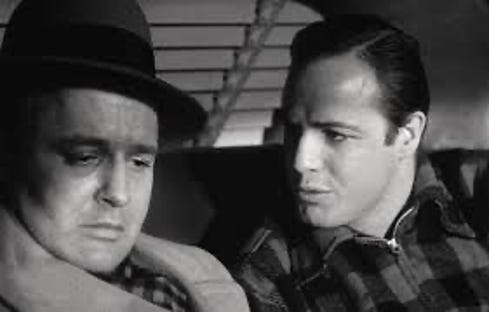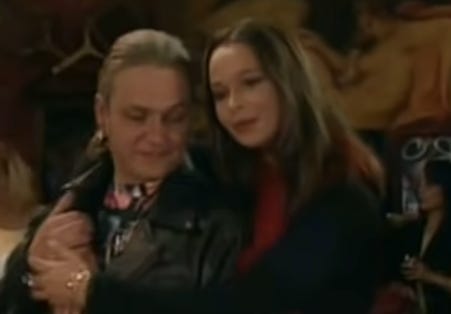You could have been a contender.
When the best time to do something was twenty years ago and the second best time was also twenty years ago. Reframing our regrets as oppurtunities for growth.
You don’t understand I could ‘a had class! I could ‘a been a contender, I could ‘a been somebody, instead of a bum, which is what I am, let’s face it… It was you Charlie.
On the waterfront, 1954. Dir. Elia Kazan.
Few lines spoken so gently land with such ferocity as Terry’s (Marlon Brando) lament in On the Waterfront.
Terry’s regret is based on the boxing match that he threw at the behest of his brother Charlie, who was making bets on his opponent.
He realizes that he will never be a world title contender now and the chance that he squandered was the pivotal moment that could have changed his entire life. There’s a real sense of loss conveyed on the scene – Terry’s loss of the life that he could have had but somehow chose not to have, all to satisfy someone else’s agenda.
How many of us have been Terry?
Regret
Regret is a very personal thing. In broad strokes, regret can be reduced to two distinct types;
Regret for things that we did.
Regret for things that we didn’t do.
Regret for things that we did are perfectly natural. These regrets are just learning experiences. For example – If I was sharp with my children because I was in a bad mood about something else. Or I was impatient with another driver who didn’t even know they were annoying me and I beeped at them. I always regret these things in the immediate term and vow not to do them again - with mixed results, but the self-awareness is there. These feelings of regret spur us to reflect on ourselves and on our behaviours and are often are beneficial in the long term. They have value.
However, here’s a weird thing. We regret things we didn’t do far more than the things we did1 . And this is a lot more interesting.
Regret for things we haven’t done
There was a time during the 1990s when backpacking around Australia on a one year visa was practically a rite of passage for young twenty somethings. I never went and I’ve always been sad that I never did at the time.
Fast forward 30 years and I’m never going to backpack around Australia, or, barring a nuclear winter and a journey that would more resemble a Cormac McCarthy novel than a Bill Bryson travelogue, anywhere else. I’m too old. And the wonders of that experience to my younger self would not now leave any lasting impression on me.
Why do we regret the non-occurrence of events? Why do we regret not taking that once in a lifetime trip when we were young, the lover who got away (we think – it’s not like we sent them a survey), the job we didn’t take or the investment we never made.
We regret these things because we only see the best outcome. We are the creator of this scenario and because it only exists in our reality and no one else’s, we can fantasise about the adventure, the romance and the wealth. Because we have no accountability whatsoever for the outcome of something that never happened.
And who are we remembering? Our real selves? Unlikely. We can all imagine a better, fitter, wiser version of ourselves. This imaginary “us” also exists in our past and we combine our regret of something we did not do with the version of ourselves that we believe was present at the time. A version of ourselves that we believe could have had the experiences that we now regret not having. A version that does not exist, other than as an aspirational construct of what we wish we were.
So we wallow in our loss of the rewards that we never reaped from the deed that we never did, as the person that we never were.
We can let these ghosts of our invented selves, in their invented world, fade away. We can acknowledge that sure, we could have been that person and could have done those things. We can take comfort from the fact that such belief gives us licence to take chances now that we couldn’t or didn’t take before.
Only to realise that the years and the opportunity have passed. That we’re too tired or jaded. That we walk a little slower now. That we’re not a smart or as witty or as beautiful. That the best time to do it was twenty years ago and the second best time was also twenty years ago.
And that maybe this invented version of ourselves is more than it seems. That it is the real us, the raw, unfiltered version of ourselves that we’ve long suppressed and hidden away underneath every facet of the status game; the job, the title, the validation, the belonging.
And so it begins.
The Mid-Life Unravelling
“All the centerfolds, that you can’t afford, they’ve long since waved their last goodbyes,
All the centerfolds, that you can’t afford, you’ve long since faded from their eyes.”
Placebo (Centerfolds, Sleeping with Ghosts)
Growing up in the 1980s and 90s, the idea of a mid-life crisis (which only ever seemed to affect men) was always comically presented on TV as buying a Porsche, getting a 21 year old girlfriend, wearing the wrong clothes and generally making a fool of yourself.
If Feydeau’s assertion that comedy is just tragedy speeded up holds, then the subjects of this ridicule were sad men indeed. These were men who had realised that they were not living their own version of life. But instead of taking stock of their reality and looking to the future, they tried to remedy this by imagining what they missed, then doing that, right now.
It was never a good look.
(Middle aged man sketch, The Fast Show. Image Credit: BBC)
Brene Browne has re-branded this the Mid-Life Unravelling (for both sexes) and her short essay on this period of our lives demanding that we become who we really are is an excellent read.
So what happens when we don’t?
Deathbed regrets
In her book The Top Five Regrets of the Dying, Bonnie Ware, a palliative care nurse who worked in Australia, listed the top five regrets as being:
1. I wish I'd had the courage to live a life true to myself, not the life others expected of me.
2. I wish I hadn't worked so hard.
3. I wish I'd had the courage to express my feelings.
4. I wish I had stayed in touch with my friends.
5. I wish I had let myself be happier.
Now, read the list again and see that Item One actually encompasses all of the other four. And I’m going to suggest that Items Two-Five could not have been achieved without at least some substantial progress being made with Item One.
“I wish I'd had the courage to live a life true to myself, not the life others expected of me.”
So when we say that…
I could have been a writer.
I could have been an entrepreneur.
I could have been an athlete.
I could have been a partner/lover/spouse.
I could have been a contender….
…then we’re leaning towards that version of ourselves that we wished we were. This is the version Brene is talking about in her essay. And its not who we wished we were. It’s who we really are.
But it’s not the version from 20 years ago that I’m concerned about. It’s the version from 20/30/40 years hence, as we crumble in old age, unable to do much of anything except to reflect on our own life gone by.
As regrets go, lying on my deathbed and regretting not living a life that was true to myself is the maximum.
Minimising our Maximum Regret
Many people live the wrong version of their life for their entire lives. For some, the trade-off is worth it. We get older and more entrenched in our everyday; our family, professional and academic lives. These arenas have rules, routines, expectations. And our continued participation within these arenas can give us safety, status and comfort.
And for less fortunate others, it may not even be a choice. The world is not fair and not everyone gets to the top of Maslow’s Pyramid. Or even know that there’s a pyramid in the first place.
For those that would try, living a life that is true to ourselves involves self-awareness, self-acceptance, the willingness to not conform to the expectations of others and the courage to accept the consequences of our actions. All well and good in our twenties. Somewhat more complicated in our fifties.
And it’s not to say that we’re all living an entirely wrong life. We all know, deep down, what we could be doing differently and the change might not be as cataclysmic to our current life as it might first appear. Sometimes the first change is relatively small in terms of external impact but huge in terms of personal impact (losing weight and getting fit being a prime example of one of the best ways to get started).
Even if we change nothing about our current situation, just the concept of living a life true to ourselves can be a personal North Star in making decisions that we’re not sure about. If a decision is made in accordance with our own true self, then it will be almost impossible to regret it, regardless of the outcome. Because if we are being true to ourselves, any other decision would have been the wrong one.
A future regret test that we can run against a choice we have to make is not “will I regret this if I do it or don’t do it”.
Instead ask “Is this course of action consistent with the life I consider true for myself?”
Unless you are (in which case I send my love to you), we are not yet candidates for Bonnie Ware’s services. We still have life in front of us. We have cause for optimism. We have technology, opportunities and prospects available to us at any age now that past Kings could only dream of. We can minimise our future regrets, but the world will not wait for us.
Run the regret test against your next big idea. If it passes, then start making a plan.
Kevin Conway is an Executive coach. For Coaching services, please see www.kevinconwaycoaching.com
References




